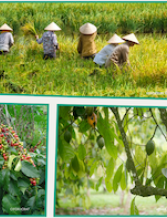
Effective Integrated Landscape Management for Sustainable Food Systems
Food systems can be transformed through multi-stakeholder transformative governance at the landscape level. Through the Food Systems, Land Use and Restoration Impact Program (FOLUR IP) projects in 27 countries deploy integrated landscape management (ILM) techniques.
Link:Customized Methodology to Assess and Measure Effectiveness of Integrated Landsc…
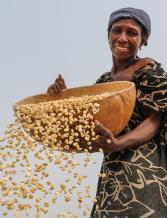
Tackling Gender and Inclusivity Challenges: Lessons Learned from FOLUR Country Projects
The benefits of engaging women in proactive leadership roles across Food Systems, Land Use and Restoration (FOLUR) program country projects are beginning to bear fruit.
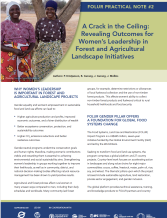
A Crack in the Ceiling: Revealing Outcomes for Women’s Leadership in Forest and Agricultural Landscape Initiatives
Women farmers hit by drought in Kenya. World Bank/Flore de Preneuf
Link: 17196-WB_FOLUR Practical Note2.pdf732.56 KB
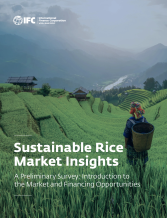
IFC’s Sustainable Rice Market Insights
Rice is a cornerstone of global food systems, feeding 3.5 billion people daily and supporting 1.5 billion livelihoods worldwide.
Link:IFC’s Sustainable Rice Market Insights, Assessment of the Sustainable Rice Platform
Link: IFC’s Sustainable Rice Market Insights.pdf14.92 MB, Assessment of the Sustainable Rice Platform.pdf9.76 MB
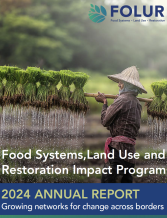
FOLUR Annual Report 2024 - Growing Networks for Change Across Borders
Over fiscal year 2024, the FOLUR Global Platform was supercharged into a larger movement by more broadly influencing change.
Link: FOLUR-Annual-Report-2024.pdf10.39 MB
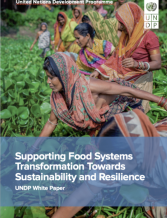
UNDP White Paper: Supporting Food Systems Transformation Towards Sustainability and Resilience
The objective of this White Paper is to identify pivotal themes and present transformative multidimensional solutions and areas of intervention for current and future UNDP engagement. It was produced by a cross disciplinary UNDP team and underwent consultation with a broad variety of internal and…
Link:UNDP White Paper: Supporting Food Systems Transformation Towards Sustainability…
Link: undp_white_paper_supporting_food_systems_transformation_.pdf5.38 MB
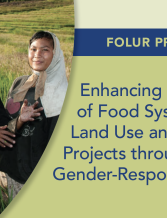
Enhancing Effectiveness of Food Systems, Land Use and Restoration Projects through Gender-Responsive Actions
This FOLUR Practical Note summarizes outcomes from a series of virtual events on gender equality hosted by the FOLUR Gender Learning Programme for the Food and Agricultural Commodity Systems Community in the context of the FOLUR Impact Program.
Link: WB_FOLUR Gender Brief.pdf856.6 KB
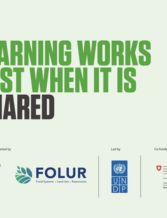
Join the Food & Agricultural Commodity Systems Community
Engage with the FOLUR Community from within the Food & Agricultural Commodity Systems Community of Practice to develop skills and share knowledge
Link:Food & Agricultural Commodity Systems Community of Practice
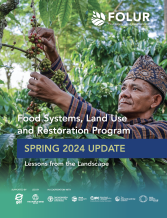
Spring Update 2024: Lessons from the Landscape
This spring update covers the period from July 1, 2023 to Dec. 31, 2023.
Link: 16954-WB_FOLUR Spring Update-WEB_1_0.pdf13.41 MB
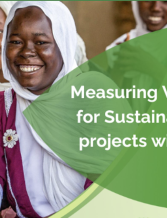
Measuring women’s leadership for sustainability in landscape projects with the W+ standard
Women’s leadership has been instrumental in ensuring equitable participation, benefits and decision-making in the design and implementation of integrated landscape projects.
Link: Women's Leadership presentation _Mar27_2024.pdf4.74 MB
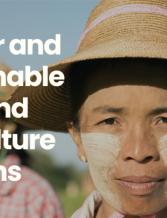
Gender Responsive Commodity Value Chains (Course 3)
Gender and FOLUR Course 3 focused on gender-responsive commodity value chains and gender considerations in farmers’ support investments.
Link: FOLUR merged presentations on gender.pdf12.07 MB
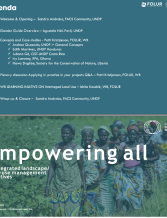
Empowering All in Integrated Landscape/Land-Use Management Initiatives (Course 2)
FOLUR projects are about empowering all kinds of people to work together to conserve natural resources more sustainably.
Link:Gender Learning Programme (Course 2, Module 1)
Link: FOLUR_GLP Course 2_Module 2.pdf9.53 MB
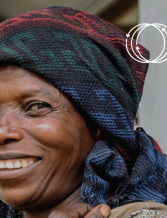
Slides: Introduction to Gender Equality Concepts in the Context of FOLUR (Course 1)
Capacity development for gender responsive interventions in FOLUR country projects.
Link:Video: Gender Learning Programme (Course 1)
Link: Capacity Development for Gender Responsive Interventions in FOLUR country projects.pdf918.87 KB
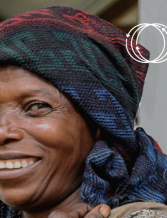
Pre-reading: Introduction to Gender Equality Concepts in FOLUR courses
Learn about gender relations and how people of different genders interact with each other, including how power and resources are divided between them.
Link:Video: Gender Learning Programme (Course 1)
Link: Pre-reading-Gender Equality Concepts and Resources.pdf1.5 MB
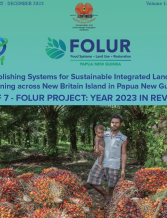
Establishing systems for sustainable integrated land use planning across New Britain Island in Papua New Guinea
Known for its exceptional biodiversity, New Britain Island in Papua New Guinea has experienced increasing deforestation due to harmful agricultural practices in recent decades. The FOLUR project aims to restore 50,000 hectares of forests on the island by supporting the local authorities in…
Link: GEF7-FOLUR Newsletter-PNG.pdf6.47 MB
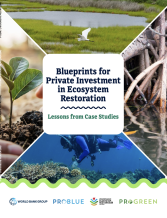
Blueprints for Private Investment in Ecosystem Restoration: Lessons from Case Studies
Tremendous efforts have been deployed globally to conserve the remaining rainforests, grasslands, rivers and lakes, reefs and mangroves, and other ecosystems that are critical for safeguarding biodiversity and the ecosystem services upon which humanity depends. However, the extent of environmental…
Link: Blueprints for Private Investment_0.pdf6.48 MB
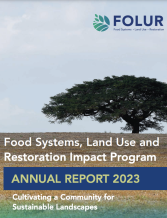
FOLUR Annual Report 2023: Cultivating a Community for Sustainable Landscapes
This annual progress report covers the period from July 1, 2022 to June 30, 2023, providing an update on the Food Systems, Land Use and Restoration (FOLUR) Impact Program’s progress and achievements.
Link: WB_FOLUR Annual Report-2023.pdf10.95 MB
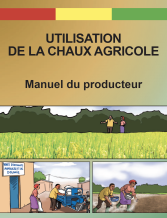
Utilisation de la chaux agricole: Manuel du producteur - Guinée
La Guinée n’échappe pas à ce constat. Cela réduit fortement la productivité des sols et la production agricole, ainsi que les efforts initiés pour parvenir à la sécurité alimentaire. Il est aujourd’hui primordial de réhabiliter ces sols acides pour contribuer à améliorer la santé des sols…
Link: Guinee Manuel producteurs riz.pdf8.96 MB
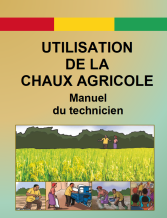
Utilisation de la chaux agricole: Manuel du technicien - Guinée
En Afrique, l’agriculture emploie environ deux tiers de la main-d’oeuvre du continent et contribue en moyenne de 30 à 60 pour cent au Produit intérieur brut (PIB) des paysi.
Link: Guinee Manuel techniciens riz-FINAL.pdf3.65 MB
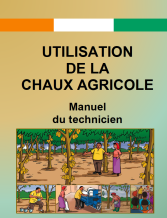
Utilisation de la chaux agricole: Manuel du technicien - Côte d’Ivoire
En Afrique, l’agriculture emploie environ deux tiers de la main-d’oeuvre du continent et contribue en moyenne de 30 à 60 pour cent au Produit intérieur brut (PIB) des paysi.
Link: CI Manuel techniciens cacao-FINAL.pdf3.43 MB
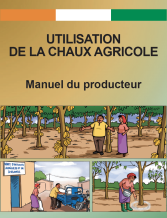
Utilisation de la chaux agricole: Manuel du producteur - Côte d'Ivoire
En Côte d’Ivoire, environ 22.7% des terres cultivées en cacaoculture sont affectés par l’acidité des solsiii. Cela réduit fortement la productivité des sols et la production agricole, ainsi que les efforts initiés pour parvenir à la sécurité alimentaire. Il est aujourd’hui primordial de…
Link: CI Manuel producteurs cacao-FINAL.pdf9.93 MB
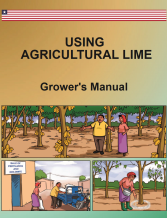
Using agricultural lime: Producer's manual - Liberia
In Liberia, more than 70 percent of people rely on agriculture for their livelihoods – the acidity found in 75 percent of soil diminishes the capacity to improve food security and increase efficiency in agricultural value chains, putting farmer livelihoods and the health of the national economy at…
Link: Liberia Producers manual cacao-FINAL.pdf4.86 MB
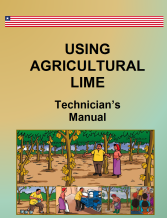
Using agricultural lime: Technician’s manual - Liberia
In Africa, agriculture employs about two-thirds of the continent's workforce and contributes an average of 30 to 60 percent of countries’ Gross Domestic Product (GDP). However, the soils are subjected to severe hardships (massive export of nutrients by crops, exposure of soils during harvesting,…
Link: Liberia technician's manual cacao-FINAL.pdf2.96 MB
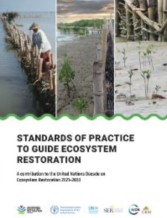
Standards of practice to guide ecosystem restoration
The U.N. Decade on Ecosystem Restoration 2021–2030 aims to prevent, halt and reverse ecosystem degradation and recover biodiversity, and ecosystem integrity; enhance human health and well-being, including sustainable delivery of ecosystem goods and services; and mitigate climate change. To create…
Link:Standards of practice to guide ecosystem restoration
Link: Standards of Practice.pdf4.71 MB
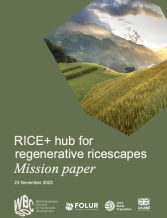
Mission Paper: Rice+ hub for regenerative ricescapes
The RICE+ hub for regenerative ricescapes mission paper -- produced by the World Business Council for Sustainable Development (WBCSD) in collaboration with member companies and partners, under the auspices of the Sustainable Rice Landscapes Initiative (SRLI) -- is a call to action to bring together…
Link:WBCSD launches mission paper for private sector to scale-up sustainable and reg…
Link: WBCSD RICE+ Mission Paper_ NOV23_FINAL.pdf2.61 MB
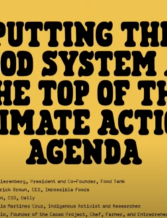
Putting the food system at the top of the climate action agenda
Food systems cause about a third of global greenhouse gas emissions. How can we redesign them to solve the climate crisis?
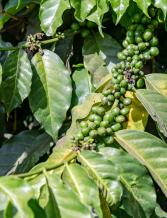
FOLUR Africa: Transforming value chains and agroforestry systems in Africa for a better food future
The Food Systems, Land Use and Restoration (FOLUR) Impact Program hosted its first Regional Dialogue, FOLUR Africa: Transforming value chains and agroforestry systems in Africa for a better food future on October 13-14, 2023, in Nairobi.
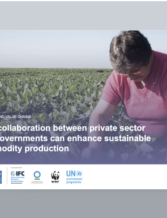
Value beyond value chains - how collaboration between private sector and governments can enhance sustainable commodity production
Building on the work of the Value Beyond Value Chains (VBV) initiative led by United Nations Development Programme and supported by the Good Growth Partnership and the insights of other leading institutions, this presentation highlights why cross-sectoral collaboration is essential to drive…
Link:Value beyond value chains - how collaboration between private sector and govern…
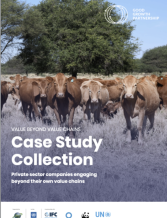
Value beyond value chains - Case study collection private sector companies engaging beyond their own value chains
Deforestation contributes to climate change, which may cause a third more of the world’s people to face food insecurity by 2050. At the same time, the commodities that drive deforestation are major components of economic development in tropical forest countries, providing a route out of poverty for…
Link:Value Beyond Value Chains - Case Study Collection Private Sector Companies Enga…
Link: GGP-casestudies-FA.pdf19.48 MB
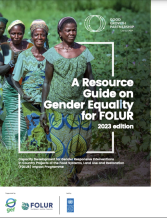
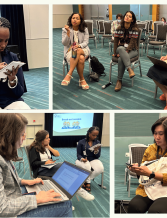
Women’s caucus builds unity at GEF Assembly to tackle agro-environmental challenges
International development meetings resulting in social and environmental commitments by governments and multinational companies are rife. At the recent Global Environment Facility Assembly in Vancouver there were encouraging signs of change.

Food And Agricultural Commodity Systems (FACS)
Find out more about the FACs Community
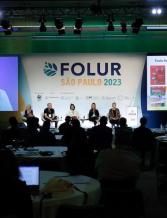
Empowering marginalized voices: The global Food Systems, Land Use and Restoration Impact Program
As we head to Vancouver to join a gathering of environmental leaders from 185 countries at the 7th GEF Assembly next week, we are reflecting on why this presents a key opportunity for women and others working on gender issues and food systems change.
Link: Gender Plenary-FOLUR-Annual Meeting 2023.pdf25.09 MB
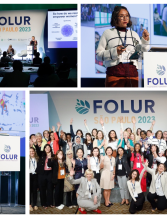
Annual Meeting 2023: Acting on critical gender issues in FOLUR countries
At the Food Systems, Land Use and Restoration Impact Program (FOLUR) annual meeting held in Sao Paulo, Brazil with country project team participants from 24 countries, a session on innovative approaches to gender integration in FOLUR interventions was held.
Link: Gender Plenary - Annual Meeting 2023.pdf25.09 MB
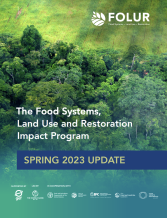
FOLUR Spring Update 2023
The FOLUR Spring Update reflects activities of partners and countries, and includes spotlight profiles detailing innovations in Brazil, Mexico, Papua New Guinea and Uzbekistan. The highlight of the season was the Annual Meeting jointly hosted by the Brazilian Government…
Link: FOLUR-Spring-Update-2023-update.pdf4.13 MB
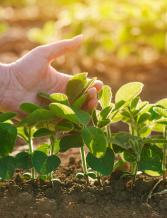
A presentation on the W+ Standard by founder Jeannette Gurung
A unique framework developed by Jeannette Gurung, the founder and executive director of Women Organizing for Change in Agriculture and Natural Resource Management (WOCAN), was designed to certify projects that create increased social and economic benefits for women participating in environment,…
Link:Bringing women's empowerment to markets: A chat with W+ founder Jeannette Gurung
Link: W+ presentation PROGREEN FOLUR webinar_2 Feb 2023 .pptx15.92 MB
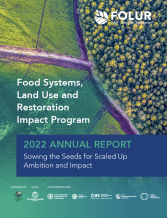
Annual Report: Sowing the Seeds for Scaled Up Ambition and Impact
As projects began to get underway, FOLUR entered a new stage over the 2021-2022 fiscal year, which ended in June. Through inception workshops, the development of introductory materials, work with implementing agencies, public and private sector dialogues began to flourish, and private sector…
Link: 91775 FOLUR Annual Report.pdf4.06 MB
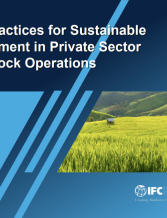
IFC practices for sustainable investment in private sector livestock operations
There are seven fundamental practices that inform International Finance Corporation (IFC) investments in livestock and aquaculture projects. IFC works with clients to help them transition to operations that follow these practices, which must underpin their activities, during the course of the…
Link:IFC practices for sustainable investment in private sector livestock operations
Link: IFC-practices-for-sustainable-investment-in-private-sector-livestock-operations.pdf5.83 MB

FOLUR comes to Indonesia
FOLUR in Indonesia is led by the Coordinating Ministry of Economic Affairs with technical support from the United Nations Development Programme and the Food and Agriculture Organization of the United Nations.
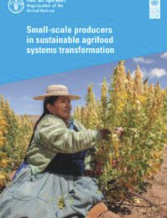
Small-scale producers in sustainable agri-food systems transformation
If the world is to transition towards agri-food systems that are more sustainable and equitable, small-scale production systems will be key to progress. Large parts of the world depend on small-scale systems for maintaining food security and nutrition. Despite this centrality, neither small-scale…
Link:Small-scale producers in sustainable agri-food systems transformation
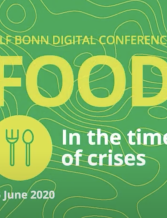
How we can achieve sustainable wood fuel production in sub-Saharan Africa
Sixty percent of households in sub-Saharan Africa use wood fuel to cook, boil water and preserve food, but unsustainable wood fuel production and trade is depleting and degrading forests and trees. In a session at the 2020 GLF Bonn Digital Conference, experts explored how to promote more…
Link:Achieving sustainable wood fuel production in sub-Saharan Africa
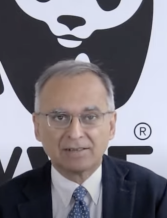
Increasing local impacts
Less than 2 percent of all climate finance flows are currently channeled to small-scale farmers, according to the International Fund for Agricultural Development. Nature-based solutions (NbS) have the potential to reconcile social, economic and environmental interests. If financed at the level…
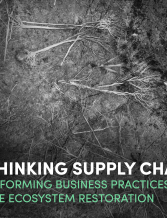
Rethinking supply chains
Today, businesses are under increasing pressure to avoid or reduce their carbon emissions and their negative impacts on landscapes and biodiversity. Food producing businesses alone account for roughly one fourth of global supply chain emissions. When it comes to deforestation, according to a 2021…
Link:Transforming business practices to enable ecosystem restoration
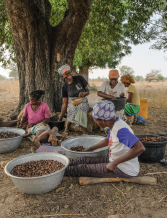
Investment cases for inclusive food systems
Smallholder communities, co-operatives and small enterprises produce up to 60 percent of the world’s food. They also meet their own demands for fuelwood, fodder and other tree and forest products, trading surpluses locally and beyond.
Link:How international finance can better meet local needs and aspirations
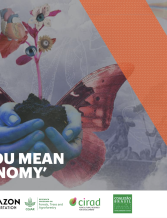
What do you mean by ‘bioeconomy’?
In recent years, bioeconomy has emerged as a ‘silver bullet’ concept to halt deforestation, promote economic growth and reduce poverty in the Amazon. Despite this enthusiasm, there is little clarity about what exactly ‘bioeconomy’ means. Some critics argue that bioeconomy is just a new slogan…
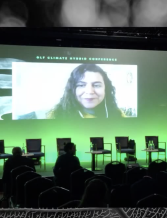
The future of food
After global representatives met for the 2021 U.N. Food Systems Summit, five major action areas were formulated, each supported by multi-stakeholder commitments around food consumption and food production, including the Food is Never Waste initiative, the Healthy Diets Initiative, the Agroecology…
Link:The future of food
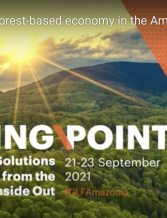
Building a forest-based economy in the Amazon
“The tipping point is here, it is now," say scientists Tom Lovejoy and Carlos Nobre. "A modern vision of the Amazon must include truly innovative elements to create profitable bioeconomies that would immediately eliminate illogical and short-sighted economies.” Amazon Conservation engaged in…
Link:How a bioeconomy can ensure the survival of Amazon’s biodiversity
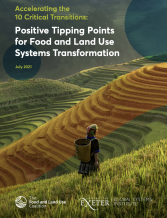
Positive tipping points for food and land use systems transformation
The Food and Land Use Coalition (FOLU) has developed a framework to guide actors in the triggering of positive tipping towards a desired system state. This framework has been co-developed by FOLU and the Global Systems Institute at Britain's University of Exeter. The framework will undergo testing…
Link: Positive-Tipping-Points-for-Food-and-Land-Use-Systems-Transformation.pdf7.7 MB
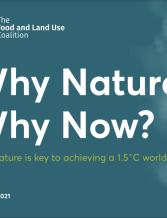
Why nature? Why now? How nature is key to achieving a 1.5 degree C world
Greenhouse gases are released through natural processes (e.g. decomposition of biomass) and as a result of human activity (e.g. the burning of fossil fuels). Some gases are naturally occurring (e.g. carbon dioxide) while others are human-made (e.g. the halocarbons). Carbon dioxide (CO2) is the…
Link: Why-Nature-PDF-FINAL_compressed.pdf11.48 MB
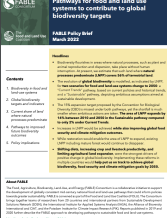
Pathways for food and land use systems to contribute to global biodiversity targets
Biodiversity and healthy ecosystems are critical to our food systems. Biodiversity includes the wide diversity of genetic resources which underpin vibrant food systems. Pollinating animals like bees are so crucial for producing nutrient-rich crops that more than half of the population in some…
Link: Pathways-for-food-and-land-use-systems-to-contribute-to-global-biodiversity-targets-March-2022.pdf991.53 KB
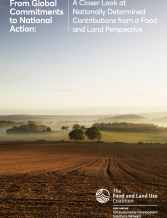
From global commitments to national action: A closer look at Nationally Determined Contributions from a food and land perspective
The Food, Environment, Land and Development Action Tracker undertook a systematic analysis of Nationally Determined Contributions (NDCs) submitted before October 2021 by G20 members and key forested countries from the Food and Land Use coalition (FOLU) in advance of COP26. Together, they represent…
Link: From-COP-to-national-action-Assessing-the-NDCs-from-a-food-land-perspective.pdf9.86 MB
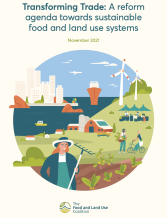
Transforming trade: A reform agenda toward sustainable food and land use systems
The U.N. Food and Agriculture Organization estimates that global trade in food reached $1.53 trillion in 2020, more than twice its level twenty years before. Trade in food is essential to meeting the needs of growing cities and food insecure countries worldwide. It enables a significant source of…
Link: Transforming-trade-a-reform-agenda-towards-sustainable-food-and-landuse-systems.pdf16.75 MB
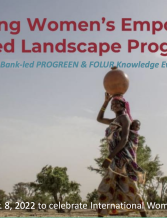
Supporting women's empowerment in integrated landscape programs
A presentation by FOLUR and PROGREEN, a World Bank multi-donor trust fund, shared knowledge and lessons learned from inclusive landscape approaches ongoing in different environments empowering vulnerable groups.
Link: Womens Empowerment Webinar IWD Mar8 slides.pdf3.99 MB
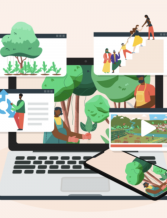
Gender and inclusion in forest landscape restoration
A self-paced online course aims to provide a comprehensive overview of gender and social inclusion, and to build capacity for various stakeholders engaged in forest landscape restoration work.Authors: M. Elias, Alliance Bioversity International & CIAT; M. Gilligan, EnGen Collaborative; M.…
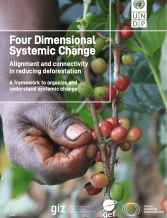
Four dimensional systemic change: Alignment and connectivity in reducing deforestation
Sustaining the world’s remaining forests and their biodiversity has been a priority for environmental policy and action for decades. Limiting deforestation is vital to meeting the Paris Agreement (Article 5) and is a central component of the Nationally Determined Contributions (NDCs) of many…
Link:Four dimensional systemic change: Alignment and connectivity in reducing defore…
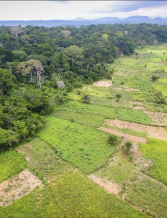
Causality assessment for landscape interventions
How do we reflect on whether our landscape or jurisdictional interventions are being effective? Would the changes we observe have happened anyway without our intervention/s? What can we do to increase our chances for impact? To address these key questions, the U.N. Development Programme developed…
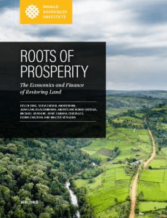
Roots of prosperity: The economics and finance of restoring land
This report provides a comprehensive analysis of the benefits and costs of restoring forests and landscapes in countries around the world, demonstrating how smart policies and innovative financing can help governments meet their restoration targets. The authors find that finance, both public and…
Link: roots-of-prosperity-exec-summary-english.pdf717.9 KB
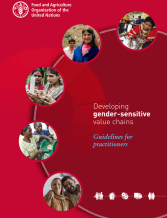
Developing gender-sensitive value chains: Guidelines for practitioners
What efforts need to be made to effectively mainstream gender in agri-food value chain projects and programmes? When can a value chain intervention be considered "gender-sensitive"? What actions can be implemented to address gender inequalities along the chain? These guidelines aim to respond to…
Link: FAO-Guidelines-Gender-Sensitive-VCs.pdf2.46 MB
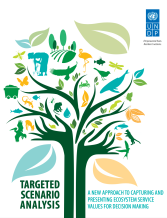
Targeted Scenario Analysis: A powerful tool for sustainable development decision making
UNDP developed Targeted Scenario Analysis as a response to growing demand from decision makers and stakeholders for more policy-relevant sustainable development analysis to support national Sustainable Development Goals. Confronted with diverse policy, management and investment choices, decision…
Link: undp-targeted-scenario-analysis.pdf5.13 MB
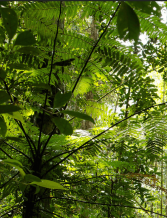
The business of planting trees: A growing investment opportunity
In recent years, hundreds of companies have entered the restoration industry. They represent a wide range of business models that deliver financial returns for investors while restoring forests and agricultural lands. This report profiles 14 businesses that are part of an emerging restoration…
Link: Business_of_Planting_Trees_Report.pdf5.8 MB
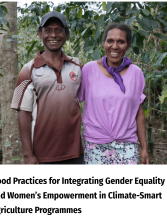
Good practices for integrating gender equality and women’s empowerment in climate-smart agriculture programmes
Women farmers are more exposed than men to climate variability and extremes, due to their limited entitlements and assets, and the restricted access to the social and natural resources required for adaptation and resilience building. In some communities it is only men who hold the right to…
Link: CARE-FAO-Good-Practices-Gender-Equality-in-CSA-Programs.pdf8.21 MB
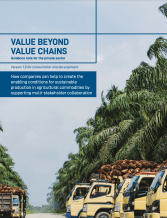
Value beyond value chains: Guidance note for the private sector
This guidance note focuses on how companies can collaborate more effectively with governments in producer countries to create the enabling conditions for sustainable agricultural production. It has been produced for major producers and buyers of agricultural commodities. It is of particular…
Link: VBV-Guidance-Note.pdf12.45 MB
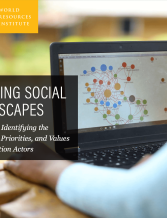
Mapping Social Landscapes: A Guide to identifying the networks, priorities, and values of restoration actors
This guidebook identifies the social capital of actors within the landscapes. It centers on two main approaches: 1) mapping actors’ resource flows and 2) mapping actors’ priorities and values. Co-written by World Resources Institute (WRI) international offices, this methodology has been tested in…
Link: 18_Guide_SocialMapping_FINAL3.pdf9.97 MB
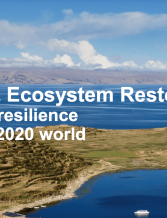
Gender & Ecosystem Restoration: unlocking resilience for a post-2020 world
The urgency of degradation, which affects 1.5 billion people — from drylands to forests to coasts — is unprecedented and unrelenting. Gender gaps are pervasive – and undermine restoration goals, while gender-responsive action delivers results. Learn more here.
Link: cbd-gender-ecosystem-restoration-en.pdf1.64 MB
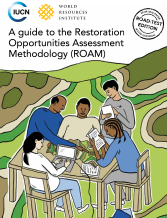
Restoration Opportunities Assessment Methodology (ROAM)
The Restoration Opportunities Assessment Methodology (ROAM), developed by IUCN and WRI, is a framework developed for countries to conduct forest and landscape restoration opportunity assessments and to identify specific priority areas at a national or sub-national level. Learn more here.
Link: guide-to-roam.pdf4.58 MB
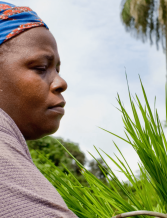
Farmers support system toolkit and scorecard
Including a practical Diagnosis Scorecard, the document provides guidance to sustainable commodity production practitioners from government, civil society and private sector on how to collaboratively assess and strengthen farmer support systems in order to achieve the broader goal of improving…
Link: Farmer-Support-Systems-Score-Card.pdf1.04 MB
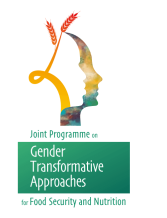
Gender transformative good practices: A compendium of 15 good practices
The Compendium is a product of the Joint Programme on Gender Transformative Approaches for Food Security and Nutrition implemented by the U.N. Food and Agriculture Organization, the International Fund for Agricultural Development and World Food Programme. It is funded by the European Union.
Link: Gender-Transformative-Good-Practices-FAO-WFP.pdf4.09 MB
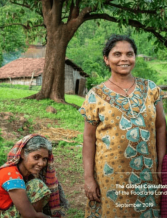
Growing Better: 10 Critical Transitions to Transform Food and Land Use
A remarkable opportunity to transform food and land use systems exists, but as the challenges are growing, acting with great urgency is required. This global report from the Food and Land Use Coalition (FOLU) proposes a reform agenda – centered around ten critical transitions – of real actionable…
Link: FOLU-GrowingBetter-GlobalReport.pdf26.73 MB
The Road to Restoration
By declaring the Decade on Ecosystem Restoration, the United Nations recognizes that there are only 10 years left to restore the world's degraded land: Countries are striving to fight climate change by 2030 through Paris Agreement commitments and the Sustainable Development Goals (SDGs). But…
Link: wri-fao-guide-road-to-restoration.pdf6.2 MB
